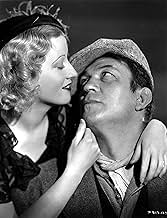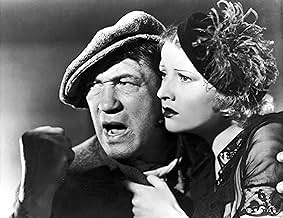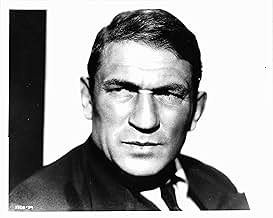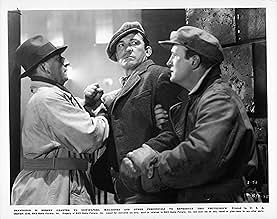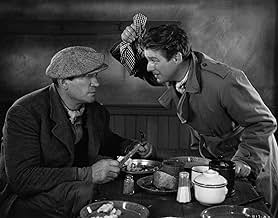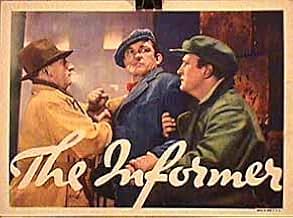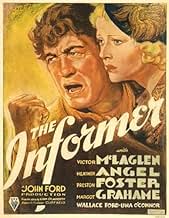NOTE IMDb
7,3/10
7,6 k
MA NOTE
Ajouter une intrigue dans votre langueIn 1922, an Irish rebel informs on his friend, then feels doom closing in.In 1922, an Irish rebel informs on his friend, then feels doom closing in.In 1922, an Irish rebel informs on his friend, then feels doom closing in.
- Réalisation
- Scénario
- Casting principal
- Récompensé par 4 Oscars
- 13 victoires et 4 nominations au total
Joe Sawyer
- Barty Mulholland
- (as Joseph Sauers)
Steve Pendleton
- Dennis Daly
- (as Gaylord Pendleton)
Denis O'Dea
- Street Singer
- (as Dennis O'Dea)
Frank Baker
- Small Role
- (non crédité)
Avis à la une
Victor McLaglen, the title character of John Ford's THE INFORMER, reminded me of the circus man from Fellini's LA STRADA. Anthony Quinn played the brutish man, who may have even been influenced by the pug-faced, Oscar-winning performance given by McLaglen. Poverty-stricken Dublin is the true-life, atmospheric setting of the picture, which takes place in 1922. Dense fog and a long damp night are the main elements of a story about deep Irish patriotism and the fight of the Irish Republican Army. The conflict of individuality and the cause is what makes THE INFORMER tick. McLaglen's large, simple character just wants to go to America and we're reminded by signs of the price for a ticket frequently. Two different signs become the psychological centerpiece for the drunken Irishman. One is the previous, the other a WANTED sign. Should he do it and get the money to go?
John Ford once famously said, "My name is Ford. I make Westerns." After seeing this film, he obviously could do a heck of a lot more. The serious social issues dealt with here are heartfelt and ones you will find yourself thinking about. And the look of the piece is amazing, consisting of long dark shadows cutting into a miserable Ireland night. Ford was always known for his luminescent, gorgeous cinematography that helped to foresee the conflicts within his characters. This is hard in color, but he did it in pictures like THE SEARCHERS, painting John Wayne in a sometimes vicious manner. Victor McLaglen's performance not only benefits from the lighting, but by the sheer simplicity of his acting. He shoves a lot. He knocks people out. He is a brute who knows no better. He should, however, know whether or not to cross the IRA.
See the film to find out the gritty details. See it also for McLaglen and Ford's patriotic portrayal of the IRA. Max Steiner's score is innovative in how it matches gestures of the characters, placing more emphasis on them. This was usually only seen in silent films, especially Chaplin. The topic of naming names or "informing" is obviously still important. Just look at how the media covered this year's Oscars, giving much attention to the Elia Kazan scandal.
John Ford once famously said, "My name is Ford. I make Westerns." After seeing this film, he obviously could do a heck of a lot more. The serious social issues dealt with here are heartfelt and ones you will find yourself thinking about. And the look of the piece is amazing, consisting of long dark shadows cutting into a miserable Ireland night. Ford was always known for his luminescent, gorgeous cinematography that helped to foresee the conflicts within his characters. This is hard in color, but he did it in pictures like THE SEARCHERS, painting John Wayne in a sometimes vicious manner. Victor McLaglen's performance not only benefits from the lighting, but by the sheer simplicity of his acting. He shoves a lot. He knocks people out. He is a brute who knows no better. He should, however, know whether or not to cross the IRA.
See the film to find out the gritty details. See it also for McLaglen and Ford's patriotic portrayal of the IRA. Max Steiner's score is innovative in how it matches gestures of the characters, placing more emphasis on them. This was usually only seen in silent films, especially Chaplin. The topic of naming names or "informing" is obviously still important. Just look at how the media covered this year's Oscars, giving much attention to the Elia Kazan scandal.
9sol-
A thought-provoking drama of desperate living, paranoia, and the consequences of one's actions, John Ford gives the film an appropriately dark atmosphere, and the sets have a nightmarish quality to them. As McLaglen stumbles half-drunk through the night, everything around him shows his feelings. His character tends to often feel guilty, but at other times he feels in the mood to celebrate. He is overcome by a wave of different emotions, upset from different things. McLaglen handles all of this very well, giving a startling realistic performance that is good enough to provide some compensation for Margot Grahame's over-acting. However, this is just the one character that is complex and fascinating. The supporting characters all are very thin, and the romance between Foster and Angel adds nothing to the tale. Even so, this is very effective film-making, with some clever use of dissolve editing and a haunting music score by Max Steiner. It is overall quite an effective film about moral play, desperation and responsibility.
A lot of movies of John Ford (Sean O'Feeney) deal with Ireland.At every stage of a long and brilliant career,he gets back to his roots in his homeland:"the informer" and "the plough and the stars" are early period;"the quiet man " is middle, "young Cassidy" is late.
Far from being "one of the worst movies of the thirties" ,"the informer " belongs to its time:that's true that the studios deny realism but that was true for Fritz Lang's "M" and Marcel Carné's "réalisme poétique" too.Anyway,at a pinch,no matter if it's a political subject in the Ireland of the twenties:what Ford has to say to us is universal:when a man betrays his best friend,be it for thirty coins of silver or for twenty quids,he will be eaten with remorse ,everything that he'll see and hear will remember him of the awful thing he's done.Gypo won't take advantage of his pitiful reward,he will loose everything except the victim's mother's compassion and forgiveness. All through this dark movie,Gypo will roam the foggy streets ,a desperate man:you should not forget that he is an outcast from the beginning:dismissed by the IRA,because he hadn't guts enough to kill a prisoner,and outside a girl,and Jackie (the man he will betray),he's on his own ,a man who suffers from hunger and,worse, lack of self-esteem -the one time when he finds solace is when he has a rest near his girl's fireplace-This character is not that much far from Peter Lorre's part in "M":both movies feature a secret trial.
As always in Ford's cinema,women are figures of peace love and understanding,and for them a man can always redeem his soul: here Katie and the mother.In "quiet man" ,Wayne is given a second chance thanks to Ireland and... Maureen O'Hara.And after all Ford's last movie will be "seven women" (1966) :a doctor(Ann Bancroft) will triumph over barbary against all odds.
Far from being "one of the worst movies of the thirties" ,"the informer " belongs to its time:that's true that the studios deny realism but that was true for Fritz Lang's "M" and Marcel Carné's "réalisme poétique" too.Anyway,at a pinch,no matter if it's a political subject in the Ireland of the twenties:what Ford has to say to us is universal:when a man betrays his best friend,be it for thirty coins of silver or for twenty quids,he will be eaten with remorse ,everything that he'll see and hear will remember him of the awful thing he's done.Gypo won't take advantage of his pitiful reward,he will loose everything except the victim's mother's compassion and forgiveness. All through this dark movie,Gypo will roam the foggy streets ,a desperate man:you should not forget that he is an outcast from the beginning:dismissed by the IRA,because he hadn't guts enough to kill a prisoner,and outside a girl,and Jackie (the man he will betray),he's on his own ,a man who suffers from hunger and,worse, lack of self-esteem -the one time when he finds solace is when he has a rest near his girl's fireplace-This character is not that much far from Peter Lorre's part in "M":both movies feature a secret trial.
As always in Ford's cinema,women are figures of peace love and understanding,and for them a man can always redeem his soul: here Katie and the mother.In "quiet man" ,Wayne is given a second chance thanks to Ireland and... Maureen O'Hara.And after all Ford's last movie will be "seven women" (1966) :a doctor(Ann Bancroft) will triumph over barbary against all odds.
One of John Ford's best films 'The Informer' doesn't feature any grand scenery of the American West. Instead the intense drama Ford was known for plays out on the no less rugged terrain of British character actor Victor McLaglen's face. The former prizefighter, who once faced Joe Louis in the ring, delivers an Academy Award-winning portrayal of disgraced IRA soldier Gypo Nolan on the worst night of his life.
The plot is gracefully simple: In 1922 Dublin, a starving and humiliated man who's been thrown out of the IRA for being unable to kill an informant in cold blood, himself becomes an informant. For £20 he betrays a friend to "the Tans" and for the rest of the night he drinks and gives away his blood money in rapidly alternating spasms of guilt, denial, self-pity, and a desperate desire to escape the consequences of his actions.
It is the remarkable complexity given to the character of the seemingly simple Gypo that is the film's most impressive achievement. In most movies a burly lout of Gypo's type would be cast as the heavy, he'd have at best two or three lines and be disposed of quickly so the hero and the villain could have their showdown. In 'The Informer' Gypo himself is both hero and villain, while the showdown is in his inner turmoil, every bit of which is explicitly shared with the audience.
Because Liam O'Flaherty's novel had previously been filmed in 1929, RKO gave Ford a very modest budget. The director and his associates, particularly cinematographer Joseph H. August, turned this to their advantage in creating a claustrophobic masterpiece about a man at war with himself. In addition to McLaglen's Oscar 'The Informer' also won John Ford his first along with wins for Best Screenplay and Best Score.
The plot is gracefully simple: In 1922 Dublin, a starving and humiliated man who's been thrown out of the IRA for being unable to kill an informant in cold blood, himself becomes an informant. For £20 he betrays a friend to "the Tans" and for the rest of the night he drinks and gives away his blood money in rapidly alternating spasms of guilt, denial, self-pity, and a desperate desire to escape the consequences of his actions.
It is the remarkable complexity given to the character of the seemingly simple Gypo that is the film's most impressive achievement. In most movies a burly lout of Gypo's type would be cast as the heavy, he'd have at best two or three lines and be disposed of quickly so the hero and the villain could have their showdown. In 'The Informer' Gypo himself is both hero and villain, while the showdown is in his inner turmoil, every bit of which is explicitly shared with the audience.
Because Liam O'Flaherty's novel had previously been filmed in 1929, RKO gave Ford a very modest budget. The director and his associates, particularly cinematographer Joseph H. August, turned this to their advantage in creating a claustrophobic masterpiece about a man at war with himself. In addition to McLaglen's Oscar 'The Informer' also won John Ford his first along with wins for Best Screenplay and Best Score.
A brilliant portrait of a traitor (Victor McLaglen in Oscar winning performance) who is hounded by his own conscience. McLaglen plays an IRA rouge who betrays his leader to collect a reward during Ireland's Sinn Fein Rebellion. The scenes showing fights and mob actions are very realistic, focusing on the desperation within individuals. The lack of hope for a better future seems to be a fate worse than death.
Director John Ford superbly creates an murky and tense atmosphere, enhanced by the foggy and grimy depiction of the Irish landscape. Max Steiner's dramatic music score adds to the cinematic delight. Oscar Winner also for Best Screenplay, nominated for Best Picture. This is one of Hollywood's Classic.
Director John Ford superbly creates an murky and tense atmosphere, enhanced by the foggy and grimy depiction of the Irish landscape. Max Steiner's dramatic music score adds to the cinematic delight. Oscar Winner also for Best Screenplay, nominated for Best Picture. This is one of Hollywood's Classic.
Le saviez-vous
- AnecdotesJohn Ford kept Victor McLaglen continually off-balance (and thus in character) by getting him drunk, changing his schedules, verbally abusing him on and off the set and filming scenes when he'd told McLaglen that they were only rehearsing. For the crucial rebel court scene, the story goes that Ford reduced the actor to a trembling wreck by promising him the day off only to bring him into the studio early and extremely hung over, insisting that he spit out his lines. McLaglen was so furious with Ford over this that he threatened to quit acting and kill the director.
- GaffesFrankie McPhillip tells his mother he travelled to her house via O'Connell Street. In 1922, the year the movie is set, O'Connell Street was still offically called Sackville Street, but the Irish Home Rule Party had unsuccessfully attempted to change it to "O'Connell Street" prior to this and this name was commonly used by nationalist Dubliners.
- Citations
Gypo Nolan: And now the British think I'm with the Irish, and the Irish think I'm with the British. The long and short of it is I'm walkin' around without a dog to lick my trousers!
- Crédits fousOpening credits prologue: 1920 "Then Judas repented himself-and cast down the thirty pieces of silver - and departed."
- Versions alternativesSince its original release, the UK prints of this film have omitted all references to the IRA, but a 1998 release on a budget video label restored these cuts.
- ConnexionsFeatured in Directed by John Ford (1971)
Meilleurs choix
Connectez-vous pour évaluer et suivre la liste de favoris afin de recevoir des recommandations personnalisées
- How long is The Informer?Alimenté par Alexa
Détails
- Date de sortie
- Pays d’origine
- Langue
- Aussi connu sous le nom de
- The Informer
- Lieux de tournage
- Société de production
- Voir plus de crédits d'entreprise sur IMDbPro
Box-office
- Budget
- 243 000 $US (estimé)
- Durée1 heure 31 minutes
- Couleur
- Rapport de forme
- 1.37 : 1
Contribuer à cette page
Suggérer une modification ou ajouter du contenu manquant

Lacune principale
By what name was Le mouchard (1935) officially released in India in English?
Répondre

